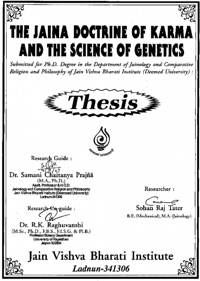Puṇyānubandhī Pāpa
There was a robber named Rohiṇi during lord Mahāvīra's time. On his father's death, Rohiṇi promised that he would not go and to listen to Lord Mahāvīra. To keep his promise he would help the poor from what he collected from robbery. But one day, things were not favourable for him and when he was on his way to commit a robbery, he learned that Lord Mahāvīra was giving a sermon on his path. He thought of changing his route. But he realized that it would take longer putting him at risk of being caught. He was puzzled because if he goes on the first path he would be unable to keep the promise he gave to his father and if he goes on second path he might get caught. After some thought, he decided to go on the path where lord Mahāvīra was preaching, but he also decided that he would cover his ears with hands so that he would be unable to hear. While he was passing the area where lord Mahāvīra was giving a sermon, a thorn pocked into his leg. He decided that he would rather bear the pain than not to pick up thorn by his hands. As we walked further the pain became unbearable and he decided to pull the thorn quickly out of his leg. He thought to himself "How much can I hear in a few seconds any way? While pulling the thorn he heard the following words:
Angels do not walk on the ground, do not cast shadows, and do not blink. Flowers they wear do not whither." He figured that these world would not affect his profession.
Rohiṇi continued on his pursuit of robbery, somehow, he got caught but did not admit any crime. Abhaya kumara the chief minister of king Sṛeṇika decided to trick Rohini by getting him drunk and creating an environment of being born in heaven. He put Rohini in a bed in a highly decorated palace and lot of young girls acting as angels. When he awoke, they asked him, "Beloved, what kind of good karmas did you accumulate that entitled you to become our master? For a moment, Rohiṇi was confused. He did not knew what was going on or whether he really was an angel. Contemplating deeply, he suddenly noticed that all the angles had a shadow, they all walked on the ground, their eyes blinked and their flowers were withering. He realized what was truely going on and recognized that it was a trap. So he went along with them. He said, he was a very nice and righteous person and had helped many people, "since Abhayakumāra did not get the confession he was looking for. He let Rohiṇi go free. Rohiṇi was amaged at what a few words of Lord Mahāvīra had done for him. After some thinking he decided to go and listen to the words of Lord Mahāvīra. After listening Lord Mahāvīra's sermon, he renounced his life and began on the path of spiritual uplift.[11]From these last two examples, we would not expect either the butcher or Rohiṇi to become spiritually elevated. For the butcher he expected outcome prevailed because all that was on his mind was killing. Rohiṇi on other hand, defiled the expected outcome because he had more on his mind than just robbing. Rohiṇi did not have a collous heart for he helped the poor and so on, while he was accumulating pāpa from robbing he also left a wisdom open through which puṇya could enter. Ultimately the effect of puṇya led Rohiṇi in the right direction. There is a lesson to be learned here.
If we have to indulge in bad activities, for whatever reasons, then we should not enjoy them. In fact we should regret committing such acts and try to do anything good if possible. We must remember that pāpa will lead us more pāpa, leaving us no chance to improve and therefore, we should try, with our fullest efforts, to avoid accumulation of pāpānubandhī pāpa. In the other scenario we have at least some chances for improvement and therefore, if it is necessary to accumulate pāpa, we should try to accumulate puṇyānubandhī pāpa.
We should now understand that if we want to have happiness and comforts than we should be careful what we do and how we do it.
The following is a list of some activities which can bring comforts to others and can ultimately provide the same for us. They are:
- Offering food to the needy (only vegetarian food).
- Offering clothes to the needy.
- Helping the sick.
- Helping others to acquire knowledge.
- Giving charity (Be sure that money is used for a good cause).
- Helping parents, brothers, sisters, grandfathers and other in need.
- Helping animals or organizations that help animals.
- Studying religion and following its precepts in our daily lives.
- Worshiping Tīrtaṅkaras like lord Mahāvīra.
 Prof. Dr. Sohan Raj Tater
Prof. Dr. Sohan Raj Tater
 Doctoral Thesis, JVBU
Doctoral Thesis, JVBU